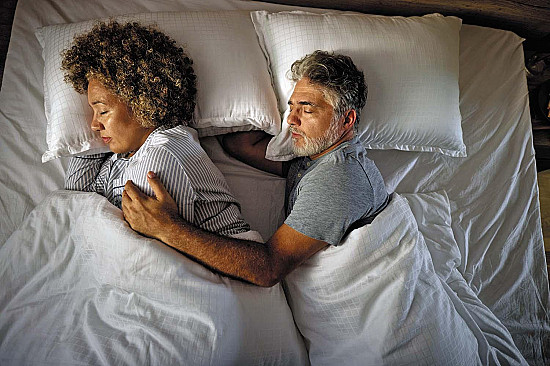REM sleep: What is it, why is it important, and how can you get more of it?
- Reviewed by Sogol Javaheri, MD, MPH, Editorial Advisory Board Member, Harvard Health Publishing

You may not think much about your dreams, other than occasionally wondering what they mean. But dreams are an important part of a sleep stage known as REM sleep. All sleep is important, but REM sleep plays a key role for brain health and function.
What is REM sleep?
Rapid eye movement (REM) sleep is part of your body's normal sleep cycle. Each of your body's sleep cycles lasts about 80 to 100 minutes. Most of us experience four to six sleep cycles per night. Your first REM episode usually lasts for just a few minutes. They lengthen during each subsequent sleep cycle. Toward the end of the night, you may spend up to half an hour in REM sleep.
REM sleep is when most of your dreams occur. During REM sleep, your heart rate, blood pressure, brain activity, and breathing increase. Your eyes move rapidly, even though they are closed. The muscles in your arms and legs also become temporarily unable to move. This prevents you from acting out your dreams as you experience them.
How much REM sleep do you need?
Just like your overall slumber patterns, your REM sleep needs shift as you age. Newborns spend about half their snooze time in REM sleep. This starts to decrease by about 6 months, and continues to decline throughout childhood and the teen years. By age 20, most people spend just over 20% of their total shut-eye time in REM sleep. In older adults, time spent in REM sleep decreases slightly, to about 17% by age 80.
Benefits of REM sleep
Benefits of REM sleep include:
- Improved learning. During REM sleep, your brain prunes its synapses, the spaces in which brain cells communicate with one another. This appears to improve memory and problem-solving abilities.
- Mood regulation. REM sleep helps your brain process emotional memories, including ones associated with fear.
- Brain development. REM sleep is thought to aid in the development of the central nervous system, which includes your brain and spinal cord. That may be one reason why infants, particularly newborns, require so much REM sleep.
- Protection against dementia. People who get less REM sleep may have a greater risk of developing dementia, according to a study published in the journal Neurology. The researchers found that for every 1% reduction in REM sleep, there was a 9% increase in the risk of dementia.
REM sleep is so important that if you don't get enough one night, your body will naturally increase it the next — you'll enter this stage earlier and stay in it for longer. This is known as REM rebound.
How to get a good night's sleep
Sleep is elusive for many of us — over 14% of American adults experience trouble falling asleep most days of the week, according to the Centers for Disease Control and Prevention. Most REM sleep occurs at the end of the night, so getting enough total sleep helps to maximize REM sleep.
Here are some tips to help you fall asleep and stay asleep:
Stick to a sleep schedule. Set a regular bedtime and wake-up time and stick to it, even on weekends and when you're on vacation. This will help to regulate your sleep/wake cycle and make it easier for you to drift off at night. If you can't fall asleep within 20 to 30 minutes, get out of bed, go to another room, and do something relaxing like reading or knitting until you feel sleepy again. Don't stay in bed and watch the clock, which can make insomnia worse. If you have trouble sleeping one night, try not to sleep later or nap the next day. Doing so will disrupt your routine. You may be more tired that day, but you will sleep better that night.
Limit alcohol and caffeine. A nightcap may help you nod off, but it suppresses your REM sleep. Caffeine also interferes with a good night's rest because it blocks brain chemicals that promote sleep. A study published in the Journal of Biological Rhythms found that three 150-milligram servings of caffeine a day — the equivalent of about 4-1/2 cups of coffee — affected REM sleep in young healthy men.
Stay active. Exercise itself has been shown to slightly decrease REM sleep. But a 2024 study published in the journal Scientific Reports found that regular physical activity increases the amount of deep, restorative sleep that you get, which in turn boosts mood and energy. Try to exercise outside in the morning, since natural light helps to set your body's sleep/wake cycle.
Relax before bed. Try the following calming rituals an hour or two before bedtime:
- Listen to soft music.
- Take a warm bath or shower.
- Stretch.
- Read. Avoid doing it on your phone or tablet, however, as those devices emit blue light that can interfere with sleep.
About the Author

Hallie Levine, Health Writer
About the Reviewer

Sogol Javaheri, MD, MPH, Editorial Advisory Board Member, Harvard Health Publishing
Disclaimer:
As a service to our readers, Harvard Health Publishing provides access to our library of archived content. Please note the date of last review or update on all articles.
No content on this site, regardless of date, should ever be used as a substitute for direct medical advice from your doctor or other qualified clinician.















